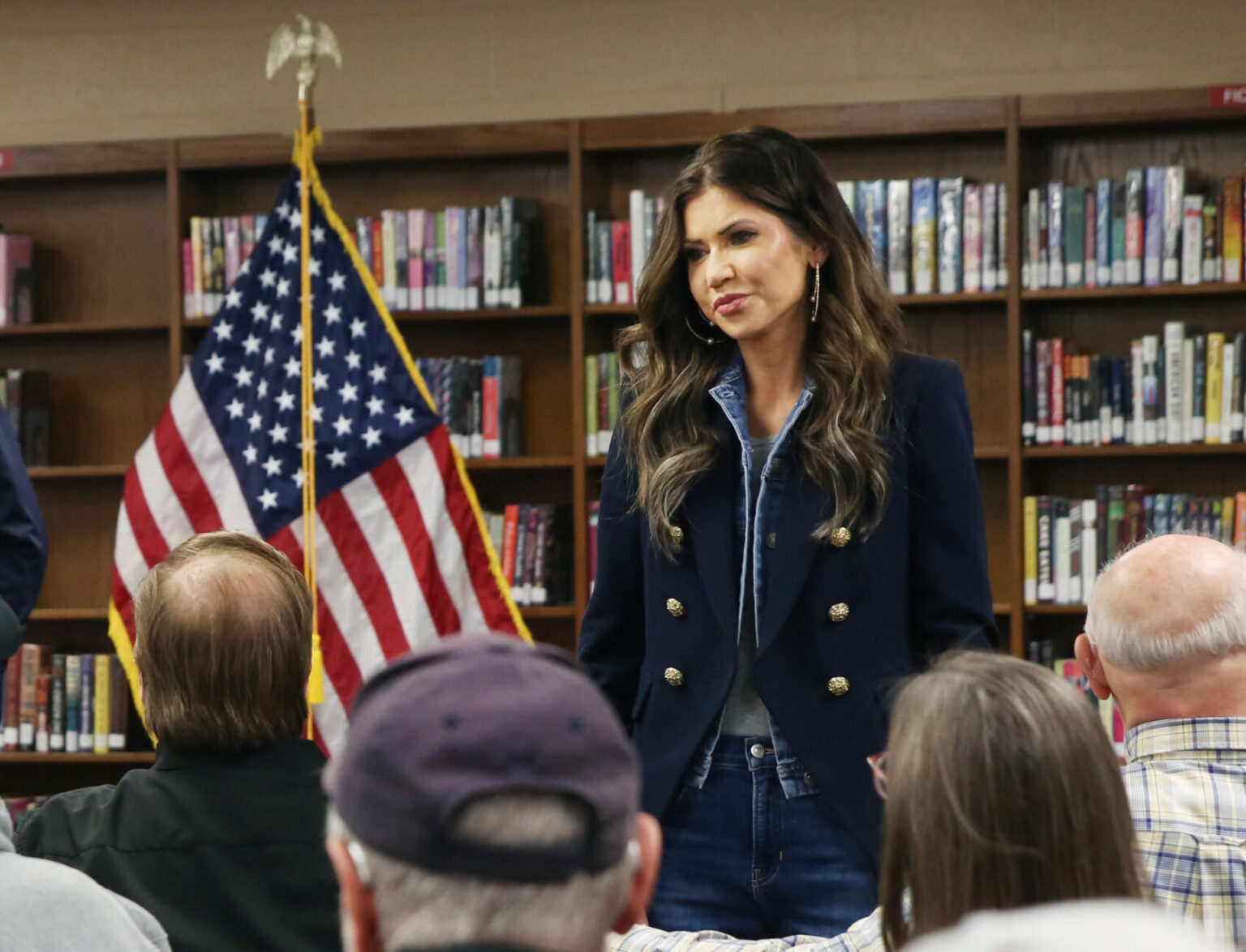
Kevin Woster – Words matter. And for Gov. Kristi Noem and her relationship with Native American tribes, two words could matter most of all: “I’m sorry.”
I’ve been thinking about the importance of apologies and their potential value to state-tribal relations since the Flandreau Santee Sioux Tribe decided to ban the governor from tribal lands.
Flandreau was the ninth of nine South Dakota tribes to impose such a ban, which should lead Noem to some pretty serious introspection. I mean, if one or two tribes give you the boot, you might be able to convince yourself that it’s them. But nine out of nine? Most reasonable people would conclude that it’s time to reassess.
And Noem has reason to reassess, and apologize. She has made some positive outreach to the tribes in some areas but has too often flubbed in others. One of the most damaging flubs was reported by South Dakota Searchlight in March when Noem spoke at a town hall in Mitchell. Noting the high unemployment rates on reservations, Noem said: “Their kids don’t have any hope. They don’t have parents who show up and help them. They have a tribal council or a president who focuses on a political agenda more than they care about actually helping somebody’s life look better.”
Sure, hope can be hard to find in poverty stricken areas. The problems are well known. But I’ve covered the reservations for many years and met many Indigenous youth who have hope and believe in themselves and their futures. I believe in them, too.
And, sure, some parents on the reservations might not show up for their kids as they should. Plenty of others do, however, sometimes in heroic, inspirational ways.
Some tribal leaders might focus, as Noem said, more on politics than helping their people. Many others, however, are working hard for their people against challenges that must sometimes seem insurmountable.
Broad-brush rhetoric is usually unfair and often harmful. But Noem wasn’t finished using it about tribal officials.
The “crisis” at this nation’s border with Mexico is a go-to point of rhetoric these days for many Republican politicians, including Noem. Especially Noem, maybe, since she has been pushing so hard for a spot on the Donald Trump team.
Noem interweaves her “war zone” rhetoric about the border (ask someone who lived through combat at Normandy or Khe Sanh or Fallujah how the Mexican border compares as a war zone) with claims about drug cartels operating on reservations in South Dakota.
And she did more than just say tribal leaders are failing to address the problem.
“We’ve got some tribal leaders that I believe are personally benefitting from the cartels being here, and that’s why they attack me every day,” Noem said.
That’s Noem doubling down in a Trump sort of way. If you’re attacked, or even just feel like you’re attacked, attack back, harder. And in this case it was a broad attack of sinister insinuation without offering a speck of proof.
That’s an awful way to communicate, especially with Indigenous people who have suffered through generations of abuse and neglect from non-tribal governments and their leaders.
The wounds are deep and understandable. Healing takes time, and trust.
Indigenous people have rich oral traditions. So words carry great weight and power. They can hurt, as Noem’s words did, or they can help. And no two words are more helpful than “I’m sorry.”
I used those words on the Rosebud Reservation back in 2016 when I was working for KELO-TV and covering a sensitive story about a 22-year-old Rosebud man who was shot and killed by a tribal police officer.
Before I set up the camera and microphone and started to do interviews with members of the man’s family, I took time to offer my sympathy but also to acknowledge that sometimes the news business had failed Indigenous people in its coverage. I said sometimes I had failed Indigenous people myself. I apologized for that and said I was committed to doing better.
After the interviews, family members came up and shook my hand and said how much they appreciated my words of apology. After that I did the same thing a number of other times while covering stories on the reservation, with similar responses.
And, in the process, I made some relationships that mattered beyond the news.
All because of those two words: “I’m sorry.”
Some tribal leaders have already suggested that an apology from the governor could help improve state-tribal relations. She messed up in her rhetoric. We all make mistakes. We should all have a chance to redeem ourselves.
But redemption starts with admitting mistakes and showing some humility. Doubling down won’t work with tribal leaders and Indigenous people. And it shouldn’t work. They’ve had generations of that. They deserve better.
When then-Gov. George Mickelson began reconciliation work with tribal leaders in South Dakota in 1990, humility was one of his greatest assets.
Pope Francis took a similar sense of humility when he went on a “penitential pilgrimage” to Canada two years ago to apologize for the Catholic Church’s role in operating boarding schools that abused Indigenous children. Francis said “I’m sorry,” but also went further and said “I humbly beg forgiveness” for the evils some Catholics committed at those schools.
The apology was just part of the church’s broader reconciliation work with Indigenous people in Canada and elsewhere. That work still has a long way to go, but apologies are a crucial beginning.
I don’t expect Gov. Noem to humbly beg the forgiveness of tribal leaders for her rhetoric. But I hope she can find the courage and humility to offer them those simple-but-powerful words: “I’m sorry.”
Who knows where the conversation could go from there.
